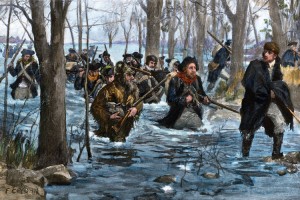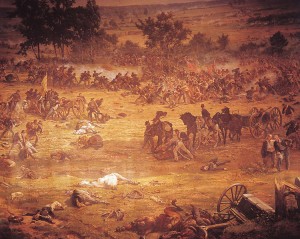More Than Just Independence Day
July 4, 2018
Today, the Fourth of July, is Independence Day in the United States. The day marks the nation’s birthday, July 4, 1776, when delegates to the Second Continental Congress, meeting in Philadelphia, adopted the Declaration of Independence. That day 242 years ago was a big one in U.S. history, but other important events have since taken place on July 4. Some events were intentionally planned to coincide with Independence Day, while others just happened to fall on the famous date. Either way, if something happens on July 4, it makes it just a bit easier to remember.

George Rogers Clark led a militia force of colonists against British troops and allied western Indian tribes during the American Revolution (1775-1783). Clark and his men captured the strategic Fort Kaskaskia in southern Illinois on July 4, 1778. Credit: © North Wind Picture Archives
On July 4, 1778, while the United States was still fighting British forces during the American Revolution, U.S. Lieutenant Colonel George Rogers Clark captured the Midwestern fort at Kaskaskia in what is now southern Illinois. Twenty-five years later, on July 4, 1803, the monumental—or should we say continental?—Louisiana Purchase was announced to the American people. Author Nathaniel Hawthorne was born a year later, on July 4, 1804.
On July 4, 1817, excavation began on the Erie Canal in Rome, New York. On July 4, 1826, songwriter Stephen Foster was born and famous Founding Fathers and former Presidents John Adams and Thomas Jefferson both died. “America” (“My Country ‘Tis of Thee”) was first sung at a Fourth of July celebration in 1831—the same day former President James Monroe died—and poet Walt Whitman fist published his famous Leaves of Grass on July 4, 1855.

On July 4, 1863, Confederate forces withdrew to Virginia after losing the Battle of Gettysburg in Pennsylvania. Credit: Detail of The Gettysburg Cyclorama of “Pickett’s Charge” (1884), a painting by Paul Philippoteaux; Gettysburg National Military Park, Gettysburg, PA (Walter B. Lane)
During the American Civil War, on July 4, 1863, the Confederate Army of Northern Virginia withdrew from Pennsylvania after losing the Battle of Gettysburg; and further west in Mississippi, the Union Army captured the important Confederate stronghold of Vicksburg. Future President Calvin Coolidge was born on July 4, 1872. Nine years later, on July 4, 1881, African American leader Booker T. Washington founded the historic Tuskegee Institute in Alabama. In 1910, black boxing champion Jack Johnson knocked out challenger Jim Jeffries on the Fourth of July.
Playwright Neil Simon was born on July 4, 1927. On July 4, 1939, Major League Baseball legend Lou Gehrig retired as the “luckiest man on the face of the earth” at Yankee Stadium in New York City. After Hawaii became a state in 1959, the 50-star U.S. flag first flew in Philadelphia on July 4, 1960. Twenty-six years later, in 1976, Fourth of July celebrations peaked during the nation’s bicentennial.


